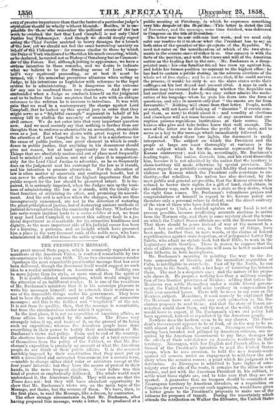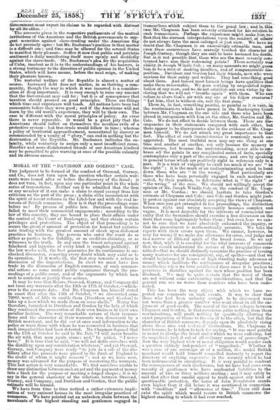THE PRESIDENT'S MESSAGE.
THEE great annual State paper, which is commonly regarded as a manifesto of the American Union, is rendered remarkable by two circumstances in this year 1858. These two circumstances render iiperhaps the most remarkable presidential message that has ever been delivered, though the document itself would suggest no such idea to a reader uninformed on American affairs. Nothing can be more jejune than its style, or more unreal than the spirit of it. It is double-diluted commonplace, which would simply tax the attention of an indifferent reader. It is one of the vexations of Mr. Buchanan's ministers that it is his sovereign pleasure to write his messages himself; and to retrench their wordiness is one of the impossible things under his government. They have had to bear the public amusement at the verbiage of successive messages; and this is the feeblest and "lengthiest" of the set. It is not from its quality, then, that the message is remarkable, but from the circumstances under which it appears.
In the first place, it is not an exposition of American affairs, as
those affairs are regarded by the nation. The Times very strangely takes it up, and treats of it, on the ground of its being such an exposition; whereas the American people have done everything in their power to testify their condemnation of Mr. Buchanan's views and policy. From end to end of the country, the elections have shown the national desire of a total severance of themselves from the policy of the Cabinet, so that Mr. Bu- chanan's exposition is precisely an account of what the American people do not think of their public affairs. It is the severest hardship imposed by their constitution that they must put up with a discredited and untrusted Government for a certain term, —.unable to change either chief ruler or ministers except at the four years' interval ; but they have the means of protest in their hands, in the more frequent elections. Never before was this kind of protest so emphatically delivered. The whole world must understand it, the Americans think. They will soon see that the Times does not: but they will have abundant opportunity to show that Mr. Buchanan's views are, on the main topic of the Message, not theirs, but the reverse of them. We have, then, in the first place, to read the Message, like a dream, by contraries.
The other strange circumstance is, that Mr. Buchanan, after having prepared this message, wrote a letter, to be produced at a
public meeting-- at -Pittshirrg,—in -which -he-expresses something very like deepatriefeelee RiendhleteielThis 'letter is dated the 22,a of November, and the message, some time finished, was- delivered to Congrese ohs' the eitheifelkesestrberen _ ' a -The later waweireenereflannit ilastiweeke and; we need' only We our readersitil ittbrehonneirtint ethe- President has to say en. botlesidee Of the'. viesteciihniehneeliosikets; of, the, Republic,. • We need hot enter o-tfeil itemeideraeateeefeeihiiihe of the •twO state- meats isitheairithireola•neebnitherdinao. ,Our *mem is With tho faCts-of the positkinentdrwith theetintesoid, willief the American natibie Re the leeding.inet`ia thd.aMieei !Mr. Buchanan is a disap- peintedimaireihisowoitaailiaehieude has-risen up against him, and- holds thefeennu: lies:him; asntipirant to: the highest office : he hoe liaditeestistaia publiatedingin-the 'averse elections of the whole set of free states; and he is aware thateillue could survive the process, i itavould?hee hilly ,4.) 'see the eilaveestates unite their suffrages oithle doet ftiendi and :.present rivaL A man. in such a &kiwi may be,exemeed foe. &ubtiig 'whether .the Republic can last another eentareelf *Web:love i enty rather admire the mode- ration of his latiguegoewhendho Inds,. his fears into the form of questions and aiys ineinsuger ofilythat the omens are far from favourable." Nothing. mill ensue from that letter. People, north or south, -will-not leave Off talking of "disunion" if events com- pel. them-, as now,' to think:About it -and rurality at elections and elsewhere will not Cease became. of any assurance that cor- ruption poisonerepublican institutions at their source. The knaves who give and, Ita.ko /bribes know that well enough. . The uses of the letter etelite disclose the perils of the state, and to serve a.s a key to the-message; which immediately 'followed it. Looked at under these, two- lights,- he . document is easily interpreted. e The subjectl on which the President and the people at large are mte thoroughly at; variance is the great subject which is -.for ;the moment- represented by the Kansas controversy; - and this 4s, accordingly, Mr. Buchanan's leading topic. The nation discards him, and his rival discomfits him, because it is not admitted by the nation that the territory is slave-territory till made, pthcrwise . by special provision. The nation regards as Patriotic courage • and fidelity that resistance to violence in Kansas which the President calls resistance to au- thority,—flat rebellion. The nation has also declared, by the most public and general act possible, that the ;Kansas citizens who refused to barter their rights for a gift of land, shall ebtain, in the ordinary way, such a position as a state as they desire, when the right time conies. Mr. Buchanan's voluminous praises and congratulations of himself in regard to his Kansas policy are therefore only a personal solace in defeat, and the direct contrary of the view of those who have defeated him.
In regard to Utah, a decided opinion on any hand is not at present possible, because conflicting accounts continue to arrive from the Mormon city, and there is some mystery about the terms on which the -United States officials are with the Mormon leaders. That there should be peace instead of war at the moment is a good; but no settlement can, in the nature of things, have been made, further than in mere words, of the claims of federal republicanism against state despotism, or of polygamist Latter Day Saints, who admit no statute book but their Bible, to work in the Legislature with Gentiles. There is reason to suppose that the state of affairs among the Mormons will soon be better understood
than hitherto, in both hemispheres. •
Mr. Buchanan's meaning in pointing the way to the fu- ture annexation of Mexico, and the immediate acquisition of Cuba, is intelligible to everybody. Cast off by the North, he can only turn to the South, with a last hope of retaining his interest there. The cast is a desperate one; and the nature of his propo- sals shows it. He proposes nothing less than a military occupa- tion of two frontier provinces of Mexico; adding that unless the Mexicans can settle themselves under a stable liberal govern- ment, the United States will seize territory in compensation for their own asserted losses. There will be more to say soon on the Mexican subject. Meantime it need scarcely be explained that the Mexicans have not sought any such protection as Mr. Bu- chanan proposes to send them; and that the story ot"Texan an- nexation would show them and the rest of the world, what they would have to expect, if Mr. Buchanan's views and policy had been approved, instead of repudiated by the American people. Nowhere does the horizon seem to be any clearer. The Presi- dent's Government appears to be at feud, or in the way to be so, with almost all its allies, far and near. Nicaragua and Grenada, having been invaded and pillaged by American citizens, are re- quired by the American Government to pay large damages for the effects of their self-defence on American residents in their territory. Nicaragua, with her English and French allies, is in- formed of the President's intention to send the -United States troops' when he sees occasion, to hold the new transit-route against all comers, under an engagement to withdraw the sol- diery when the occasion ceases; a point which his judgment is to determine. As Nicaragua is admitted to have rights of sove- reignty over the site of the route, it remains for the allies in con- ference, and not with the American President in his cabinet, to settle what those rights are, and to take care that they are re- speeted. A guarantee that no trespass should be committed on Nicaraguan territory by American invaders, or a requisition- Congress for powers to prevent such aggression would have given a better grace to the President's proposals to make use of the isthmus for purposes of transit. During the uncertainty which attends the retribution on Walker the filibuster, the United States GoVerranentnimst exit ite &devil* be regarded with distrust,
by all ita allies., . The accounts given in the respective parliaments of the mutual: iniritntions of Age American sail the British governments to sug- gest meenritieii against slain-trailing under the American flag. doino_t precisely agree : but Mr. Buchanan's position in that matter/ is a dAoidt one; .and. time may be allowed for the several Sttites- tainanifest their pleasure. Suffice it now that public and patriotic
sentiment is daily Manifesting itself more openly and decidedly against the slave..trade. ,/Mr. Buehanan's plea ter the acquisition, ,Caba, insolent as it-is to the understandings of his hearers, he a strong testimony to the direction of public opinion in the 'United States, which• -will have means, before the next reign, of making their pleasure known: The material welfare of the Republic is almost a matter a course. Increased debt does not matter, in so thriving a eon- mnnity, though the way in which it was incurred is a consider- ation of deep importance. It is easy enough to raise any amount that the Government may call for ; but it is of consequence that taxation should proceed on good principles. These are thing& which time and experience will teach. All nations have been bad economists before they were good ; and if the Americans will net learn by the old world's experience, they will by their own. The ease is different with the moral principles of policy. An error there is never reparable. It would be a great pity that the Americans should inflict on themselves the needless evils of a protective system : but free-trade would follow in time ;'whereas a policy of territorial aggrandisement, necessitated by slavery or recommended by a vanity of "glory," can end in nothing but the destruction of th'e Republic. Mr. Buchanan indicates the ca- lamity, while venturing to assign only a most insufficient cause. Heartier and more disinterested friends of our American kindred may be permitted to give warning at once of the possible calamity and its obvious causes.



























 Previous page
Previous page